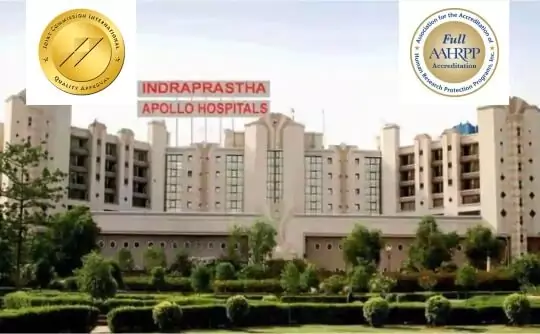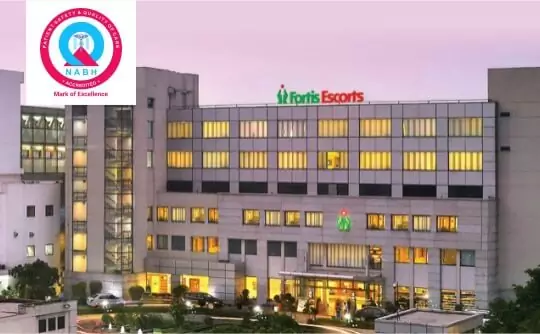

A significant component of a Cardiac Resynchronization Therapy Cost in India is the heart surgeon's fees. IndiCure only recommends highly experienced, skilled, board-certified heart surgeons who have proved track record of consistently delivering excellent results. While the charges may vary based on the surgeon's experience, you can be confident that you are in safe and capable hands when opting for affordable heart surgery in India with IndiCure Health Tours.
In the pursuit of enhancing patient care and efficiency of procedure, the medical field continually introduces new techniques and technologies into surgical procedures. These innovative advancements are designed to improve outcomes, reduce recovery times, and increase the overall effectiveness of treatments. While these advancements can significantly benefit patient care, they may also lead to higher Cardiac Resynchronization Therapy Cost in India.
Selecting an accredited medical facility with skilled and qualified medical staff is essential for the success of Cardiac Resynchronization Therapy in India. Larger cities in India generally have better medical facilities and more experienced heart surgeons, leading to higher costs. IndiCure Health Tours recommends surgical facilities in these larger cities to prioritize quality of care and ensure safety of our overseas patient guests.
The costs related to surgery include expenses incurred pre- and post-surgery. The expenses related to pre-surgery vary depending on the age and medical condition of the patient and thus requiring different number and type of investigations. Expenses post-surgery include costs incurred for prescription medications and follow-up consultations.
At IndiCure Health Tours, we consolidate most of the expenses for your Cardiac Resynchronization Therapy in India to provide you with an all-inclusive budget. After receiving medical reports, your case manager will provide an estimated cost based on a discussion with the heart surgeon in India.
The final Cardiac Resynchronization Therapy cost in India can however be confirmed after your face-to-face consultation with the heart surgeon in India.

We Help you Choose the Right Treatment, Surgeon & Hospital

We Arrange Video/Telephonic Consultation with the Surgeon

We Assist you with Visa & Accommodation

We Receive you at the Airport and Drop you at Hotel/Hospital

We Assist you the at Hospital & Provide Post Operative Support
IndiCure Health Tours enables savings on your medical travel to India. We choose to partner with the top hospitals in India to negotiate special rates, ensuring you get most affordable and best quality healthcare when you plan your medical travel with us.

Here is a set of questions you should consider asking before commencing your medical journey for the Cardiac Resynchronization Therapy in India.
Prepare to answer questions about your:
Cardiac resynchronization therapy is a procedure in which a device is implanted in your chest to help your heart's chambers squeeze (contract) more efficiently and in a more organized way.
A biventricular pacemaker (also known as a cardiac resynchronization device) delivers electrical signals to both lower chambers of the heart after cardiac resynchronization therapy (CRT). The signals cause your ventricles to contract in a more coordinated manner, resulting in better blood pumping out of your heart.
CRT therapy means you will have the pacemaker placed under your skin by minor surgery. Wires from the device are connected to the ventricles on both sides of your heart. The CRT device sends electrical signals to the ventricles to make them pump together the way they should. This type of electrical stimulation is called biventricular pacing.
If your heart rhythm is dangerously unpredictable, the device may also include an implantable cardioverter-defibrillator (ICD), which can give an electrical shock to reset your heartbeat.
Cardiac resynchronization therapy devices include:
Cardiac resynchronization therapy is a treatment for heart failure in patients who have uncoordinated ventricular contractions.
Your heart muscle is weakened with heart failure, and it may not be able to pump enough blood to support your body. This can be exacerbated if the chambers of your heart aren't in rhythm with one another.
Cardiac resynchronization treatment can help you manage your heart failure symptoms and reduce your risk of consequences, including death.
Your doctor will make a small cut (incision) in your upper chest, and create a pocket under the skin. This pocket will safely house the wires and the computer battery pack, which powers and controls the CRT device, ensuring it functions properly.
Your doctor will put IV lines in the large vein that feeds your heart. He or she will put CRT wires (leads) into the vein and feed them into your heart. Special X-rays will be taken to make sure the leads are in the right place on both sides of your heart.
Once the leads are properly placed and working, they will be connected to the CRT pacemaker. The pacemaker will be inserted through the incision and under your skin. The incision will be closed with sutures or staples, and a dressing will be applied.
After cardiac resynchronization therapy, you'll spend 1-2 nights in the hospital. Before you leave the hospital, your doctor will test your device to ensure that it is properly programmed. After a few days, most people can resume their normal activities.
It is critical that you follow your doctor's instructions to the letter. For the first six weeks, you may need to minimize activities including lifting, straining, and stretching. Inquire with your doctor about when you can resume specific activities.
Make sure your doctor checks the device's functionality on a regular basis. At least once every six months, this should be done.
In around 7 out of 10 cases of heart failure, cardiac resynchronization therapy is effective. CRT does not work for everyone with heart failure. If you have advanced heart failure, for example, you are less likely to react to CRT. If you have mild to moderate heart failure, CRT may help you live longer, improve your heart function, and enhance your quality of life.

New Delhi
Indraprastha Apollo Hospitals, New Delhi is a state of the art multi speciality tertiary-care hospital situated in the most posh area of South Delhi. Considered to be the flagship hospital of Apollo group, Indraprastha Apollo Hospital is one of the important landmarks not only in Delhi, but in the world map because of its popularity among the medical tourists. The hospital has been one of the most sought after medical institutions for patients from Asia Pacific and beyond.

New Delhi
Fortis Escorts Heart Institute and Research Centre is one of the most revered medical institutions not only in India, but the entire world. The institute has set benchmarks in cardiac care with path-breaking work over the last 25 plus years. The hospital has the most advanced technology and has seen the best outcomes even in the most complex cardiac cases; be it cardiac surgery, Interventional Cardiology, Pediatric Cardiology, Pediatric Cardiac Surgery or Non-invasive Cardiology
CRT (Cardiac Resynchronization Therapy) devices come in two primary types:
CRT-P (Cardiac Resynchronization Therapy Pacemaker)
Also called a biventricular pacemaker, this is a specialized type of pacemaker that sends electrical signals to both the left and right ventricles, helping them beat in sync. This synchronization improves the heart's efficiency and relieves symptoms of heart failure.
CRT-D (Cardiac Resynchronization Therapy Defibrillator)
This device performs the same resynchronizing function as CRT-P but with an additional feature: it includes an implantable cardioverter defibrillator (ICD). The ICD can detect life-threatening arrhythmias (irregular heartbeats) and deliver shocks to restore normal rhythm, preventing sudden cardiac arrest.
Studies show that survival rates for patients with CRT devices are promising. On average:
CRT-P patients have a median survival of 4.62 years after implantation.
CRT-D patients live slightly longer, with a median survival of 5.15 years.
These outcomes depend on individual health conditions, the progression of heart failure, and other factors like age and lifestyle.
The typical recovery and travel plan for CRT implantation in India involves:
Hospital stay: 2-3 days
Post-discharge recovery in India: 7-10 days
To ensure a smooth recovery and follow-up consultations with your doctor, it is recommended that you stay in India for a total of 12-14 days.
Yes, modern CRT devices are MRI-compatible. This means that, under certain conditions, patients with CRT implants can safely undergo MRI scans. Your cardiologist and radiologist will coordinate to ensure the scan is done correctly without interfering with the device.
After full recovery from CRT implantation, most patients can resume their normal daily activities. However, it's essential to avoid high-impact or rough-contact sports, as these activities could damage the implanted device. With proper care, patients often enjoy a good quality of life, engaging in most of their favorite hobbies and routines.
Many patients with a CRT device can participate in moderate activities, such as walking, gardening, or light exercises. However, it's important to avoid activities that involve intense physical contact, such as rugby, football, or boxing, to reduce the risk of injury to the chest area where the device is implanted.
Yes, most household appliances are safe to use if they are in good working condition. Devices like:
Magnets can temporarily affect the functioning of CRT devices. Items like:
Should be kept at least six inches away from your chest to avoid interference. Your doctor will give you detailed instructions on safe usage around magnetic fields.
Patients who use a CRT device can travel with confidence and safety. A Medical Device ID card is given to the patient. This card serves as a reminder to medical and security officials that you have a CRT device implanted.
NOTE: It's critical to keep the card with you when traveling because the gadget contains metal pieces that could set off metal detectors at airport security.
Airport security wands may potentially cause the device to malfunction temporarily. Instead of employing a handheld wand, security staff should do a hand search. If a wand is being used, you can request that the security professionals search the device swiftly and without holding the wand over it. Because it may have an impact on the device.
In addition to the actual procedure cost for Cardiac Resynchronization Therapy Cost in India, there are several other expenses you should plan for when organizing your medical trip to India. These include:
By taking these additional expenses in account, you can arrive at total cost of Cardiac Resynchronization Therapy Cost in India, which will ensure a smooth, comfortable recovery experience.
Enhance your medical journey to India by availing these extra services.
Traveling abroad for medical reasons may be challenging. With our experience of over a decade and working with the best surgeons and top hospitals in India, we help make your medical tour easier and safer for you. We will guide you at every step of the way and make end-to-end arrangements for your surgery, travel, and stay.
Ramandeep Dhaliwal
I had great experience having rhinoplasty through Indicure. Dr. Ruchika from Indicure has helped me in finding best plastic surgeon, answering all my questions...
Read More
Joshua Archer
My name is Joshua Archer I'm from New Zealand, bay of plenty, kawerau I opted for the bypass surgery in January 2023 but planned it in advance for 28 September found IndiCure...
Read More
Kera Ren
Absolutely loved my experience with IndiCure - from first inquiring to meeting the surgeon pre op to my follow up post op. The surgeon was extremely approachable...
Read More
Andreana Paul
Had a wonderful experience. Visited India for my plastic surgery. From sending mails, airport pickup, comfortable accommodation and, to smooth hospital appointment booking...
Read More
Brandi Luce
I had the privilege of using Indicure's services for a cosmetic procedure that I had wanted for a long time but had always been apprehensive about. Ruchika helped me...
Read More
Jade M
Indicure Health Tours went above and beyond my expectations. They helped me with every aspect of my journey and were professional, kind and caring. I was...
Read More
The content on the website (www.indicure.com) is intended to be general information and is provided only as a service. All photographs on our website of before and after results are examples only, and do not constitute an implied or any other kind of certainty for the result of surgery.
Learn about IndiCure Health Tours' comprehensive editorial policy that strives to deliver trustworthy, helpful, relevant, accurate and people-first content on medical tourism in India.
It is not medical advice and should not be taken as medical advice. It should not be used to diagnose or treat a health condition and is in no way meant to be a substitute for professional medical care. You are advised to see a surgeon in person to assess what surgery may or may not accomplish for you.
It is also important to keep your expectations realistic and to understand that all surgical procedures carry risks and should never be taken lightly.